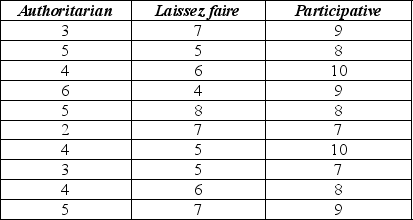Multiple Choice
Consider the following to answer the question(s) below:
Management styles differ among organizations and may potentially affect employee job satisfaction. A sample of employees was randomly selected from each of three companies with different management styles (Authoritarian, Laissez faire and Participative) and asked to rate their level of job satisfaction on a 10-point scale (10 being the highest level of satisfaction) . The data collected and partial ANOVA results appear below.


-The P-value for this statistic turns out to be < 0.001. Therefore, at α = 0.05
A) We fail to reject the null hypothesis.
B) We reject the null hypothesis and conclude that mean employee job satisfaction ratings are not all equal across companies with different management styles.
C) We conclude that mean employee job satisfaction ratings are all equal across companies with different management styles.
D) We fail to reject the null hypothesis and conclude that mean employee job satisfaction ratings are all equal across companies with different management styles.
E) We reject the null hypothesis and conclude that mean employee job satisfaction ratings are all equal across companies with different management styles.
Correct Answer:

Verified
Correct Answer:
Verified
Q1: Consider the following to answer the question(s)
Q1: Consider the following to answer the question(s)
Q2: Consider the following to answer the question(s)
Q3: Consider the following to answer the question(s)
Q4: Consider the following to answer the question(s)
Q6: Consider the following to answer the question(s)
Q8: Consider the following to answer the question(s)
Q9: Consider the following to answer the question(s)
Q9: A health food company wants to determine
Q11: A survey of online consumers asked respondents